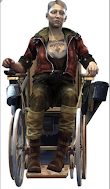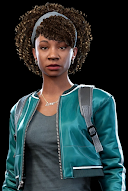Representation in Games
Characters in Games:
There have been quite a few characters that represent the disabled community, with a varying scale of relatability to them. Most characters tend to, pre-research, fall into 2 categories of they either are relatable or they aren't, and for me most disabled characters, mentally and physically, fall into the not very relatable category.
Looking at 2 specific character from the game Wolfenstein showcases 2 physical types of disabilities
 |
| Max Hass - Wolfenstein: New world Order |
 |
| Caroline Becker - Wolfenstein: New world Order |
Max Hass is physically deformed by the huge dent in his head, but is shown to be obedient and strong so is used for muscle in the crew.
Caroline Becker is wheelchair bound so lack mobility but possess great leadership skill and smarts.

|
| Hailey Cooper - Marvels Spider-man 2 |
A popular Character that is disabled is Hailey from Spider-man 2 who is deaf and relies on ASL to communicated with people, or a computer generated voice on her phone.

In terms of a character I relate to the most its surprisingly not a naturally born deaf person as in most forms of media, especially games, most deaf people are either fully deaf and require sign language or not deaf at all, so for me I relate to Hawkeye the most.
Whilst I cant shoot a bow or can be considered a "superhero" I find myself relating to him most, post hearing loss, because his condition is most similar to mine. All he has is hearing aids, he can speak speak clearly, has full mobility and doesn't fully understand sign language he just struggles to hear, which for me is what I relate to most.
Characters and their Disabilities:
- Joker: Mass Effect - Brittle Bone Disease
- Sir Alister Hammerlock: Borderlands - Amputee
- Hailey Cooper: Spiderman 2 - Deaf
- Khalid: Baldur's Gate 1 - Speech impediment and Anxiety
- Cerise: Marvels Avengers - Wheelchair
- Billie Lurch: Dishonoured - Amputee
- Junkrat: Overwatch - Amputee
- Joshua Graham: Fallout New Vegas - Severe Burns
Looking at Articles about representation:
Whilst looking at articles there was a comment made in one of the articles that talked about Representation on the whole but it spoke about how considering all the groups that could be represented in games industry, and media in general, they tend to look at gender and race, whilst for the large part ignoring disabilities and not just the physical side of it. That's not to say that there isnt an increase in characters with disabilities, just not as often or apparent as other representation showcased in games
Along with looking at physical disabilities, the mental side doesn't get much representation either, with even an even less showcase than the physical.
The "Main" issue with disability representation:
A main issue I've seen with most representation is that the disabled character, normally amputee, overcomes their issues other than the typical "realistic" way but by it being retroactive reset or improved in someway that make it so its no longer a disability. The best example I have seen is Billie Lurk in Dishonoured who loses, regain and then loses her limbs again




Comments
Post a Comment